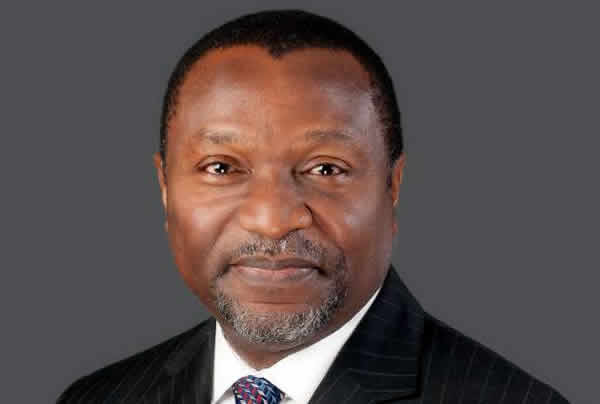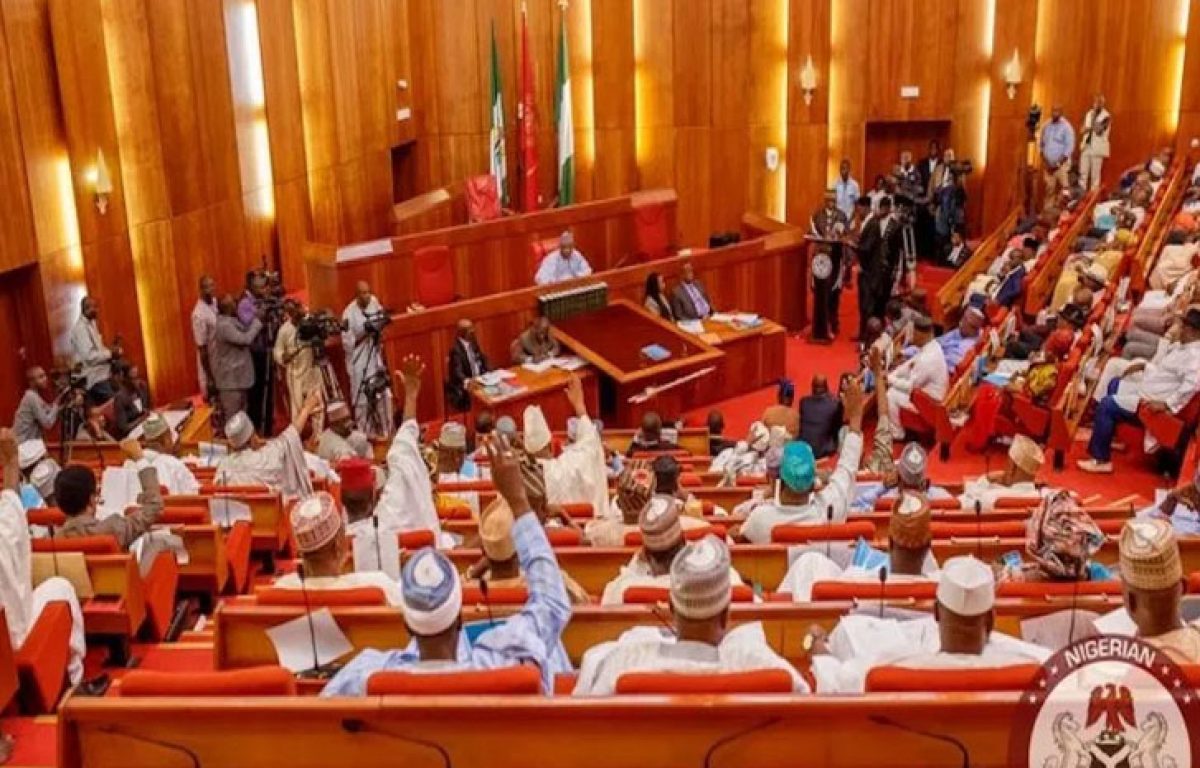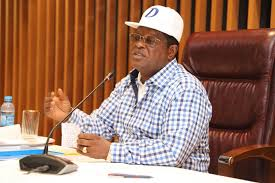Business
Budget 2016, N5000 Intervention Fund And Matters Arising

By Shola AKINGBOYE The National
Assembly’s Joint
Committee on
Appropriation
recently
descended on President
Muhammadu Buhari’s plan
to set aside N500bn in the
2016 budget condemning the
N5,000 Social Intervention
campaign promise from
the much awaited 2016
appropriation.
This hitherto would
probably force the APC
led government to ditch its
campaign promise to the
people for the year 2016,
except a cogent measure
is taken as premised by
the minister in charge of
National Planning and
Budget, before the fiscal
policy is passed into law
come March 17th.
But from every indication
and going by the National
Assembly’s resolve to pass
the budget into law in few
days, it appeared the planned
relief for unemployed and
vulnerable by the Buhari
administration has hit the
rocks.
Though, the Joint
Committee in trying to
defend why it obliterated
the N5000 idea has blamed
a section of the media for
misinterpretation of its
position, but what the NASS
failed to defend is that it
still maintained its ground
that it is either a clear cut
analysis on how the money
would be disbursed, rather
the lawmakers suggested
that such huge amount is
deferred till 2017.
Without prejudice to
the hide and seek posture
of the NASS on the matter
however, the whole show
might sound disappointing
to the proponent of the
scheme, the APC led
government. But the more
interesting is that the
hammer is coming from
APC dominated National
Assembly, and not few
analysts considered this as
a sign that the much desired
Change has truly begun
regardless of whose ox is
gored.
Though, the disclosure
was made at the interactive
session with government
officials, chaired by
Danjuma Goje, a senator
and former governor who
assured that the 2016
budget will be passed by
March 17, but was quick to
annihilate the passage of
N500bn intervention fund
as contained in the budget
proposal as lacking clear
implementation strategies.
“There is no detailed clear
cut structure being laid
down for implementation
of this project because what
we have in this budget is
N300bn Recurrent and
N200bn Capital. We had
to push hard to get some
details which was not
convincing. For instance,
the explanation we got is
that N5000 will be given to
one million Nigerians.
“Who would choose the
one million people, what
structure you have in place
to make sure that you choose
the right people? You want
to ‘give money N5000 to
about one million market
women or thereabout and
in my place we do not have
many market women, and
how would you choose
market women to represent
all interests.
“We have not gotten
clear explanation
to these numerous
issues surrounding the
implementation of this
money. Even the afternoon
school feeding contained
in the budget is not feasible
because some student
study under non conducive
environment. Will feeding
them enhance their
learning, “Goje said.
According to the
lawmaker, though the
National Assembly is in full
support of the programme,
but said implementing
it in 2016 budget might
not be feasible. Instead he
suggested that the money
be added to the budgetary
allocation of sectors like
Power, Transport and
Health. He also suggested
that the project should be
kept in view towards 2017
when the better strategy
would have been perfected.
“We are all happy with
the project and I am a party
man to the core but what
need to be done needs to be
done very well.
“I think there is a need
to do a greater work on
implementation otherwise
this money will go down the
drain.
“We support this
program, we want Mr.
President to succeed, we
want our party to succeed,
we want to continue to win
this election but we want the
program to be successful”,
he said.
Without recur to
wrangling and show of
strength that beclouds the
8th NASS since inception,
one would adduce to the
fact that the 8th NASS
should be applauded
for such an oversight
execution of its checks and
balance obligation. This
action of the lawmakers
might definitely be seen
as never a push against
the executive arm, rather
a right step in the right
direction suggesting a sharp
departure from ‘business as
usual’ syndrome in which
government business is
run in the past, particularly
when matters of national
interest were eroded on
platter of party politics.
As would recall,
lack of clear-cut
government expenditure
characterized activities
of the past governments.
The immediate past
administration in particular
was severely battered for
having tactfully presided
over a corrupt government
aided by the 7th NASS which
was dominated by his party
members. A quick reminder
of such was the rot in the
Subsidy Re-Investment,
the SURE-P scheme, and
likewise the partisan
approval of the $2.1billion
for arms procurement at the
periphery of 2015 general
elections. Neither would the
general public or agitations
by members of the civil
society organizations stop
David Mark led National
Assembly from rushing
into the approval of the
conspicuous loan, and the
resultant of that singular act
is that the fund ended in few
individual bank accounts,
hence the Dasuki Gate.
Undoubtedly, if clear
cut slogan of the current
National Assembly has
being the watchword of the
previous administration
particularly on budgetary
and its implementations,
cases of the dirty
corruptions and the ongoing
revelations in the arms deal
would probably have been
checkmated.
Moreover, not few
analysts until now were
worried that President
Buhari though widely
trusted and known for
his personal disposition
against corrupt practices
and wastage, but wagging
question is would he be
everywhere to monitor how
a well-planned government
schemes are implemented.
However, while kudos to
8th NASS for the oversight
they have demonstrated as
far as the functionality of
N500bn intervention fund
is concern, they probably
may have saved Nigeria
another imminent project
summersault like that of
SURE-P, and Nigeria and its
economy would be grateful if
such tempo is maintained to
include a complete jettison
of buying for themselves
N50billion worth of exotic
cars when no members of
the 8th NASS have been
trekking to plenaries. If
President Buhari could turn
down N400 million bills
for President’s fleet of Cars,
saying “because the vehicles
I am using are good enough
for the next 10 years” what
stops the 8th NASS? It is
unarguable that when lack
of clear cut government
plan is approved, the
end result is wastage
and misappropriation of
government funds.
Business
Senate Committee Commends Tinubu on Launch of National Halal Economy Strategy to Tap $7.7trn Global Market*

The Senate Committee on Finance has commended President Bola Ahmed Tinubu for launching Nigeria’s National Halal Economy Strategy, describing it as a bold and strategic move to position the country within the lucrative global halal market, estimated at $7.7 trillion.
In a statement signed by its Chairman, the committee praised the initiative as timely and aligned with international best practices. Several countries—including the United Kingdom, Canada, Australia, Malaysia, Indonesia, Saudi Arabia, the United Arab Emirates, Turkey, Brazil, Thailand, and Singapore—have successfully used halal frameworks to boost manufacturing, agricultural exports, financial markets, and foreign investment.
The committee highlighted Nigeria’s strong advantages for success in this space, including its vast agricultural resources, large domestic market, youthful population, growing manufacturing sector, and expanding services industry.
It noted that the strategy fits seamlessly into the Tinubu administration’s broader economic reforms, such as boosting non-oil revenue, diversifying exports, creating jobs, supporting small and medium enterprises (SMEs), and increasing foreign exchange earnings.
President Tinubu, represented by Vice President Kashim Shettima, officially unveiled the strategy on Thursday, February 6, 2026, at the Presidential Villa in Abuja.
The framework, developed in collaboration with Saudi Arabia’s Halal Products Development Company (HPDC) following a bilateral agreement signed in February 2025 at the Makkah Halal Forum, aims to enhance quality standards, certification processes, and competitiveness across sectors like food, pharmaceuticals, cosmetics, tourism, and ethical finance.
The committee described the strategy as inclusive, market-driven, and globally oriented, while fully respecting Nigeria’s diverse and pluralistic society.
It is projected to contribute significantly to the economy, with estimates suggesting it could add around $1.5 billion to Nigeria’s GDP by 2027 and unlock billions more in domestic value over the coming decade through expanded exports and investment.
The Senate Committee on Finance pledged its full legislative support, oversight, and cooperation to ensure smooth implementation, regulatory clarity, and long-term fiscal sustainability in the national interest.
“This decisive step reinforces Nigeria’s readiness to adopt proven international models, unlock new economic frontiers, and establish itself as a competitive player in the evolving global economy,” the statement concluded.
Business
Ex-Naval Chief Named in ₦100m Property Transaction Dispute
A property transaction dispute has emerged involving Zoe New Dawn Nigeria Limited and a former Chief of Naval Staff, following claims by the company’s chairman, Engr. Dr. Stephen Achema Akpa, that a ₦100 million payment made for land was not followed by a transfer of ownership.

According to Akpa, the payment was made in connection with a land transaction reportedly facilitated by the former naval chief. He alleged that despite documented payments, the land in question was neither transferred to the company nor was the money refunded.
Akpa said Zoe New Dawn Nigeria Limited possesses transaction records and related documents which, he claims, support its position in the dispute. He added that the company has initiated steps to seek redress through appropriate legal channels.
The matter has drawn attention due to the profile of the parties involved, particularly against the backdrop of recurring disputes linked to land ownership and property transactions in Nigeria’s real estate sector.
Industry observers note that unresolved land transactions remain a common source of litigation, often arising from disagreements over title documentation, intermediaries, and contractual obligations.
Zoe New Dawn Nigeria Limited stated that it intends to pursue the matter through lawful means to determine liability and recover any funds deemed outstanding.
As of press time, no official response had been issued by the former Chief of Naval Staff regarding the allegations. The dispute has not yet been confirmed as the subject of any court proceedings.
Business
Umahi Inspects Lekki Corridor’s 7th Axial Road Project, Expresses Confidence in CHEC

Minister of Works Senator Dave Umahi over the weekend inspected the progress of the 7th Axial Road project in the Lekki Corridor of Lagos.
The project, located behind the Dangote Refinery, is a crucial cargo handling route for the Lekki Deepwater Port and connects the Lekki Corridor with the Sagamu route.
The Minister expressed confidence in China Harbour Engineering Company Limited (CHEC), the project’s contractor, citing its successful delivery of the Lekki Deepwater Port and high-quality progress on the Makurdi-Enugu road reconstruction and expansion project. Umahi instructed that the roadbed filling work for Project LOT1 be completed by the end of April and directed the project team to accelerate resource input and tangible works to meet the deadline.
The 7th Axial Highway is expected to synergize with key infrastructure projects like the Coastal Road, Dangote Road, and Lekki Port, creating a comprehensive transportation hub model and boosting Nigeria’s port economy and industrial corridor. Umahi emphasized the need for environmental protection agencies to ensure efficient construction and steady progress while maintaining ecological safety.
A representative of CHEC who spoke during the inspection stated that the company would maintain a high level of resource input, implement the Minister’s directives, and coordinate safety, quality, and environmental protection to ensure the project’s timely and high-quality completion in other to unluck its port relief and regional economic benefits.
-

 Uncategorized5 years ago
Uncategorized5 years agoFG, states urged to harness flooding for ranching, others with technology – Agbaje
-

 Headlines10 years ago
Headlines10 years agoBreaking: EFCC seals Borno House of Assembly, as Hon members take to their heels
-

 News12 years ago
News12 years agoNigeria Security Operatives Stage Manhunt For Homosexual Perpetrator
-

 News9 years ago
News9 years agoHow 21-year-old Girl fled community over accusation of lesbianism
-

 News10 years ago
News10 years agoYobe Gov Moves Against Deputy
-

 Opinion7 years ago
Opinion7 years ago7 signs she has friend zoned you
-
Technology4 years ago
Online job placement company headhunts women
-

 Headlines10 years ago
Headlines10 years agoBorno Dep Gov Abducts Another Church Leader





